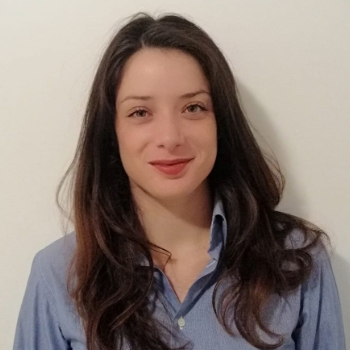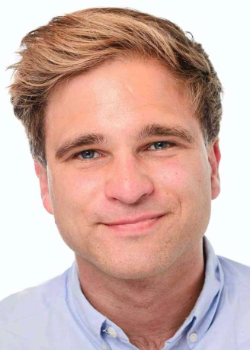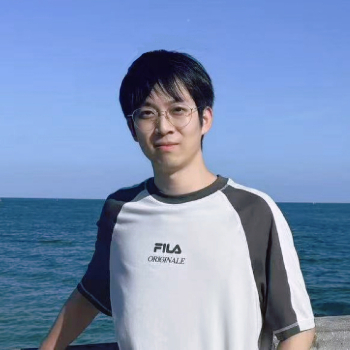2025 September Prize Spotlight
Congratulations to the SIAM prize recipients who were recognized at the 2025 SIAM Conference on Financial Mathematics and Engineering (FM25), which took place July 15-18, 2025, in Miami, Florida, United States.
- Francesca Primavera - 2025 SIAM Activity Group on Financial Mathematics and Engineering Conference Paper Prize
- Johannes Wiesel - 2025 SIAM Activity Group on Financial Mathematics and Engineering Early Career Prize
- Yumin Xu - 2025 SIAM Activity Group on Financial Mathematics and Engineering Conference Paper Prize
Francesca Primavera
Dr. Francesca Primavera, University of California, Berkeley, is one of the recipients of the 2025 SIAM Activity Group on Financial Mathematics and Engineering Conference Paper Prize. Dr. Primavera presented her paper, “Functional Itô-formula and Taylor expansions for non-anticipative maps of càdlàg rough paths” at the 2025 SIAM Conference on Financial Mathematics and Engineering. Finalists presented their papers for the consideration of the prize selection committee, who selected two recipients after the session.

The SIAM Activity Group on Financial Mathematics and Engineering awards the prize every two years to recognize outstanding research presented by students and postdocs at the SIAM Conference on Financial Mathematics and Engineering. Up to six finalists will be selected to present their work and up to two awards will be made at the conference. Each award has equal merit.
Dr. Primavera is a postdoctoral researcher in the Industrial Engineering and Operations Research department at the University of California, Berkeley. She completed her Ph.D. in mathematics at the University of Vienna, under the supervision of Prof. Christa Cuchiero and Dr. Sara Svaluto-Ferro. She holds an M.Sc. in mathematics from the University of Turin, Italy, specializing in probability and analysis. She also earned an M.Sc. in mathematics for finance and data from École des Ponts ParisTech as part of the "Bézout Excellence Program." Her research focuses on stochastic analysis, rough path theory, and mathematical finance, with a particular interest in the mathematical foundations of signature methods and their applications to financial modeling and control problems. Learn more about Dr. Primavera.
Q: Why are you excited to receive the award?
A: I am truly honored to receive this award for our paper, "Functional Itô-formula and Taylor expansions for non-anticipative maps of càdlàg rough paths," co-authored with Christa Cuchiero and Xin Guo. Much of this work was developed during my doctoral studies, and having it recognized by a committee of experts is highly encouraging. This recognition motivates me to continue advancing my research, exploring new directions, and embracing the challenges that lie ahead.
Q: Could you tell us about the research that won you the award?
A: Signatures have recently emerged in machine learning and mathematical finance as a powerful tool for extracting features from time-series data. The signature of a path or time series is defined as the collection of all its iterated integrals. Conceptually, these iterated integrals can be seen as the path-space analogue of polynomials, and with the appropriate path-space topology, many useful properties of polynomials carry over naturally to signatures.
A central feature is the universal approximation property, a Stone-Weierstrass-type result stating that linear functions of the signature are dense in the space of continuous path functionals, i.e., functionals that depend on the system’s entire history. Parallel to such results, our research aims to develop Taylor expansions of path functionals in terms of the signature. Analogous to classical analysis, this approach provides quantitative estimates of the approximation error of a path functional in terms of the signature. To achieve this, we build on fundamental concepts from rough path theory, functional Itô calculus, and path signatures, while introducing key novel tools in the differential calculus of path functionals.
Q: What does your work mean to the public?
A: This work aims to advance the theoretical foundations of signatures in machine learning by developing expansions of path functionals in terms of signatures. It provides a rigorous framework that can support further developments and enable applications of signature methods in both machine learning and mathematical finance, grounded in greater mathematical rigor and a solid theoretical foundation.
Q: What does being a member of SIAM mean to you?
A: Engaging with the SIAM community through conferences and events has been instrumental in our research, fostering collaboration and the exchange of ideas. I am proud to be a member of SIAM, which organizes conferences worldwide. These meetings are vital for advancing new research and discussing emerging directions with scholars from both academia and industry. They have greatly contributed to my growth and broadened my perspective, particularly on the latest developments in mathematical finance.
Interested in submitting a nomination for the SIAM Activity Group on Financial Mathematics and Engineering Conference Paper Prize? The prize next opens for nominations on September 15, 2026.
Johannes Wiesel
Dr. Johannes Wiesel, Carnegie Mellon University and University of Copenhagen, is the recipient of the 2025 SIAM Activity Group on Financial Mathematics and Engineering Early Career Prize. Dr. Wiesel received the award “for fundamental results on the martingale optimal transport problem and its applications to mathematical finance.” He was recognized at the 2025 SIAM Conference on Financial Mathematics and Engineering.

The SIAM Activity Group on Financial Mathematics and Engineering Early Career Prize is awarded at the SIAM Conference on Financial Mathematics and Engineering to one individual in their early career for distinguished contributions to mathematical modeling in finance in the three calendar years preceding the award year.
Dr. Wiesel is currently an associate professor at the University of Copenhagen. From 2023-2025 he was faculty in the Department of Mathematics at Carnegie Mellon University and from 2020-2023, he was an assistant professor in the Department of Statistics at Columbia University. In summer 2020, he received a Ph.D. from Oxford University under the supervision of Jan Obloj.
Q: Why are you excited to receive the award?
A: Receiving the early career prize for my work on the martingale optimal transport problem is a great honor. It is a great recognition for my work on model uncertainty, which I have been fortunate to share and discuss with many researchers throughout my career. It will certainly motivate me to continue my work in mathematical finance and drive mathematical innovations in the future!
Q: Could you tell us about the research that won you the award?
A: My research focuses on a specific kind of optimal transportation of probability measures. This research stream originally goes back to a problem posed by Gaspard Monge in 1781 and has since then been investigated by many famous mathematicians, in particular the Fields medalists Cedric Villani and Alessio Figalli. I am particularly interested in optimal transport problems that satisfy an additional martingale constraint; this is motivated by mathematical finance considerations, where martingales are considered fair games, that are the basis for pricing of derivatives. It turns out that the seemingly simple additional martingale constraint changes the structure of the optimal transport problem significantly, and my research focuses on uncovering its new characteristics. So, broadly, the research recognized by this award involves developing these foundational algorithms and data structures, rigorously analyzing them theoretically, engineering them into high-performance systems, and demonstrating their real-world value in critical areas like data storage and memory management.
Q: What does your work mean to the public?
A: Pricing and hedging financial derivatives is an important task in the banking industry. The 2009 financial crisis has shown that one cannot simply rely on plain-vanilla models that make a lot of simplifying assumptions. My work shows that it is possible to price derivatives using only information that is available in the market, and that the resulting prices are robust with respect to these market inputs.
Q: What does being a member of SIAM mean to you?
A: SIAM conferences and journals provide great opportunities to exchange ideas and stay on top of recent developments in the community. Taking part in activities organized by SIAM has been key to my academic development so far, and I am sure it will be in the future as well!
Interested in submitting a nomination for the SIAM Activity Group on Financial Mathematics and Engineering Early Career Prize? The prize next opens for nominations on May 1, 2026.
Yumin Xu
Yumin Xu, Peking University, is one of the recipients of the 2025 SIAM Activity Group on Financial Mathematics and Engineering Conference Paper Prize. Xu presented his paper, “Diffusion Models for High-Dimensional Return Generation and Factor Recovery” at the 2025 SIAM Conference on Financial Mathematics and Engineering. Finalists presented their papers for the consideration of the prize selection committee, who selected two recipients after the session.

The SIAM Activity Group on Financial Mathematics and Engineering awards the prize every two years to recognize outstanding research presented by students and postdocs at the SIAM Conference on Financial Mathematics and Engineering. Up to six finalists will be selected to present their work and up to two awards will be made at the conference. Each award has equal merit.
Xu obtained a bachelor's degree in mathematics and a second bachelor's degree in economics from Peking University in 2023. He is currently a Ph.D. student in mathematics at Peking University, under the supervision of Professor Ruixun Zhang. His research interests lie in generative modeling and machine learning with applications to finance.
Q: Why are you excited to receive the award?
A: It is a great honor to receive this award! Being recognized by experts in the field gives me confidence in pursuing new research directions and encourages me to continue exploring how emerging technologies can help us better understand and model complex financial systems.
Q: Could you tell us about the research that won you the award?
A: My research proposes a diffusion factor model that integrates latent factor structures into generative diffusion processes to address the challenges of high dimensionality and data scarcity in financial simulation. By decomposing the score function through time-varying orthogonal projections, our method captures low-dimensional structures in asset returns and embeds them into neural network architectures. We provide theoretical guarantees showing that both distribution estimation and latent subspace recovery errors depend primarily on the factor dimension rather than the number of assets, overcoming the curse of dimensionality. Empirical results demonstrate improvements in portfolio construction and factor estimation under small-sample regimes.
Q: What does your work mean to the public?
A: This work aims to advance how we model and generate high-dimensional financial data in uncertain and data-scarce environments. By leveraging the factor structure of financial data through generative methods, it enables more powerful tools for tasks like covariance estimation and portfolio optimization. Beyond academic impact, these methods have the potential to support more robust and transparent financial decision-making in practice, contributing to the long-term resilience of markets and institutions.
Q: What does being a member of SIAM mean to you?
A: I deeply appreciate the platform SIAM offers to share research and connect with the applied math community, where thoughtful discussions often spark new directions. Presenting at SIAM conferences has sharpened my thinking and broadened my perspective. Engaging with outstanding applied mathematicians through SIAM has been essential to my development as a researcher.
Interested in submitting a nomination for the SIAM Activity Group on Financial Mathematics and Engineering Conference Paper Prize? The prize next opens for nominations on September 15, 2026.
Related Reading



Stay Up-to-Date with Email Alerts
Sign up for our monthly newsletter and emails about other topics of your choosing.



